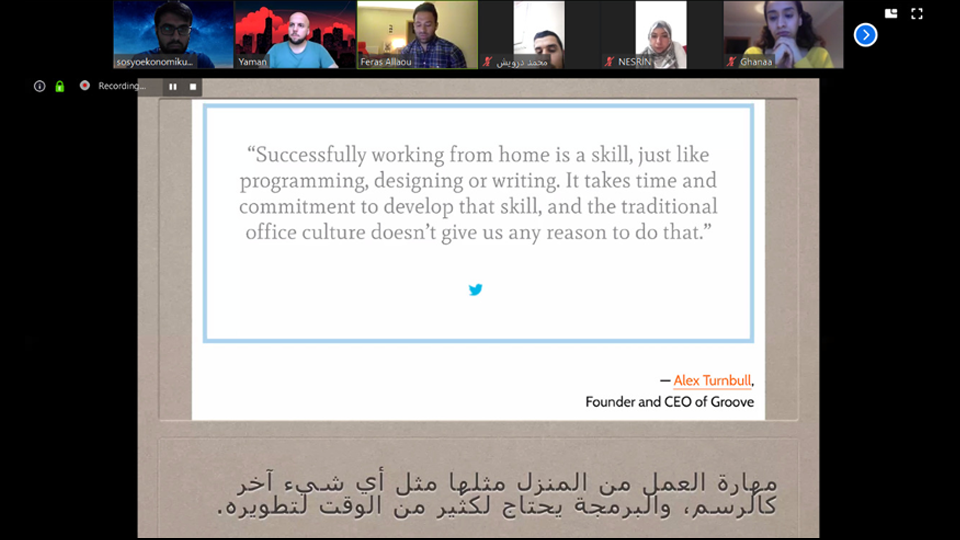To combat COVID-19, UN Women is digitally empowering Turkish and Syrian women
Turkey has taken lockdown measures to slow down the spread of the COVID-19 pandemic between March and June. During confinement, digital skills become essential to reach services and information, communicate with people, learn and work. Together with Habitat Association, UN Women Turkey has provided trainings to improve the digital literacy of Turkish and Syrian women.
Date:

An online training provided by UN Women and Habitat Association to improve the digital skills of Turkish and Syrian women. Photo: UN Women
“Thanks to the online financial literacy trainings I have attended, I am now able to use mobile banking. This took a huge burden off my shoulders,” says Esma Haj Albid, a young Syrian woman in Şanlıurfa, south-eastern Turkey, and one of the participants. Not having to go to the bank during the COVID-19 crisis makes her feel much safer, she says.
“I used to wait in long queues as they allowed only one person at a time into the bank. After the training, I can do everything online. These days, it is much easier and safer to do banking sitting on your couch.”
Because women are among the most affected by the socio-economic impact of COVID-19, UN Women and Habitat Association have partnered up to support and help host and refugee women build their economic resilience to this and future crises. Together, they have set out to provide online trainings to 2,000 young Syrian and Turkish women and men until the lockdown measures are eased. This partnership is supported through the regional programme “Strengthening the Resilience of Syrian Women and Girls and Host Communities in Iraq, Jordan and Turkey,” funded by the European Union, the EU Regional Trust Fund in response to the Syrian Crisis (the EU Madad Fund), and the Government of Japan.
“We provide different types of trainings to boost the digital literacy and skills of young Syrian and Turkish women. This makes them stronger in coping with the challenges caused by the COVID-19 pandemic. For example, our financial literacy trainings help women plan their budget, do online banking as well as use credit and debit cards safely,” explains Birbey Kılınçcı from Habitat Association. Other trainings help participants to become ‘user-experience writers’ by improving their technical skills in building user-friendly websites and online stores. “They learn how to create the best possible experience for website visitors through prototyping and user-focused testing methods. This way, women increase their employability in the highly-demanded IT field,” he says.
Through this project, women are also offered psycho-social support to cope with the COVID-19 crisis. Esma Sendi, a young Syrian refugee woman in Gaziantep, is happy to attend an online gathering with a counselor where they discuss the psychological impact of COVID-19. “Being there with young Turkish and Arab people to discuss the impact of COVID-19 on us was very beneficial for me. It made me realize that the strange feelings I started to have were actually common, and that many of us experience them as young women.”
By bringing Syrian and Turkish women together, the online trainings also enhance social cohesion in their communities. Through workshops on prejudices and stereotypes, Syrian and Turkish young people discuss together the challenges facing them, and brainstorm ways to overcome them.
“Through the workshop on prejudices and stereotypes, I became aware of my prejudices. Now, I know them and will take action to minimize them,” says Ayşenur Tekin, a Turkish young woman attending these workshops.